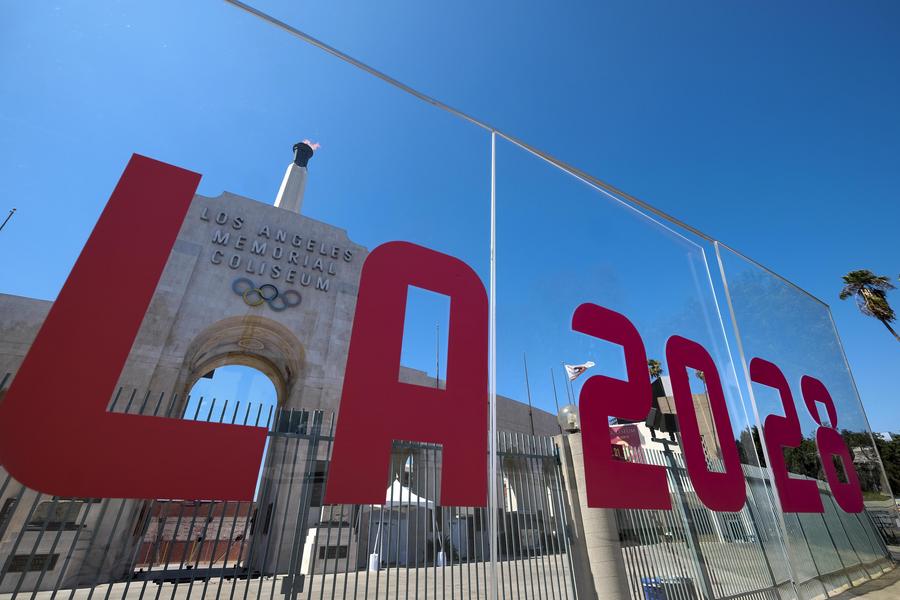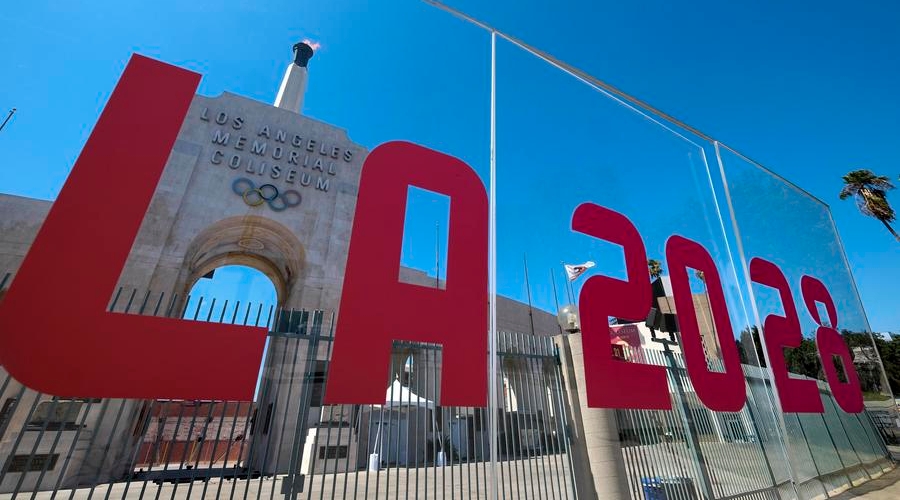The International Olympic Committee (IOC) has decided to pause the host election process for future Olympic and Winter Olympic Games after a two-day Executive Board meeting concluded in Lausanne, Switzerland, on Thursday.
Newly-elected IOC President Kirsty Coventry invited IOC members to participate in a day-and-a-half of consultations on Tuesday, following a presidency handover ceremony on Monday.

An LA 2028 sign and a blazing Olympic cauldron are seen at the Los Angeles Memorial Coliseum, the United States, Sept. 13, 2017. (Xinhua/Zhao Hanrong)
The "Pause and Reflection" workshop with IOC members focused on five main topics, namely athletes, the Olympic Games, the Olympic Movement, a Better World Through Sport, and other aspects such as revenue generation and engagement.
"There were so many incredible ideas. We really just touched the surface. I think the members felt that we could have probably spent a week together to really come out with stronger recommendations," Coventry said.
One of the main topics is the bidding process and the proper time of host selection of the Olympic Games and the Olympic Winter Games.
"We will be setting up a working group to look into this for two main reasons. Members want to be engaged more in the process. And secondly, there was a very big discussion in and around when the next host should be awarded," Coventry said.
"We want to use the learnings from LA [the 2028 Los Angeles Olympics)] and from Brisbane [the 2032 Olympics], as well as the French Alps [2030 Winter Olympics], who have had a much shorter lead time. But in the case of LA and Brisbane, a much longer lead time. So there was a lot of discussion from all the members on when is the appropriate time to select a future host," she added.
The IOC Future Host Commission nominated the French Alps as the hosts of the Games in November 2023, seven years before the start of the event. Los Angeles was formally awarded the 2028 Games in September 2017, and Brisbane was awarded at the 138th IOC Session in Tokyo in July 2021, both 11 years ahead of time.
Coventry said: "All the interested parties are going to be a part of this consultation. They wanted to be included in the process a little bit more and to be able to better understand the process. How do we include the members so that they can also be educated on those steps taken? When do we award the Games? What does that look like? Let's have a reflection. Let's have a review of the process to really analyze when is the best time to award the Games."
As the first female IOC President, Coventry has positioned herself as a leading advocate on gender issues.
"There was an overwhelming support -- not just the majority, but all the members -- shared with us before they left that we should protect the female category.
"With that, we are going to set up a working group, made up of experts and International Federations. We understand that there will be differences depending on the sports, but it was fully agreed that we should make the effort to place emphasis on the protection of the female category and that we should ensure that this is done in consensus with all the stakeholders," she said.
The EB meeting reallocated the medals of the women's 1,500m in athletics after the disqualification of Russia's Tatyana Tomashova due to an anti-doping violation. Tomashova's silver medal was awarded to Abeba Aregawi of Ethiopia, and the bronze medal went to Shannon Rowbury of the United States.
The disqualification of Belgium's Domien Michiels also resulted in the modification of the ranking of the Equestrian Team Finals at the 2024 Olympics, as Belgium was disqualified from its fifth-place finish.
Among other topics, Patricia O'Brien was appointed interim Chair of the Ethics Committee until the next IOC Session.


 Share:
Share: 




 京公網(wǎng)安備 11010802027341號(hào)
京公網(wǎng)安備 11010802027341號(hào)